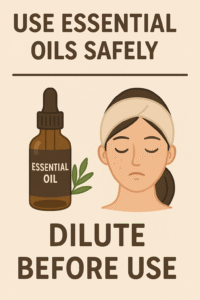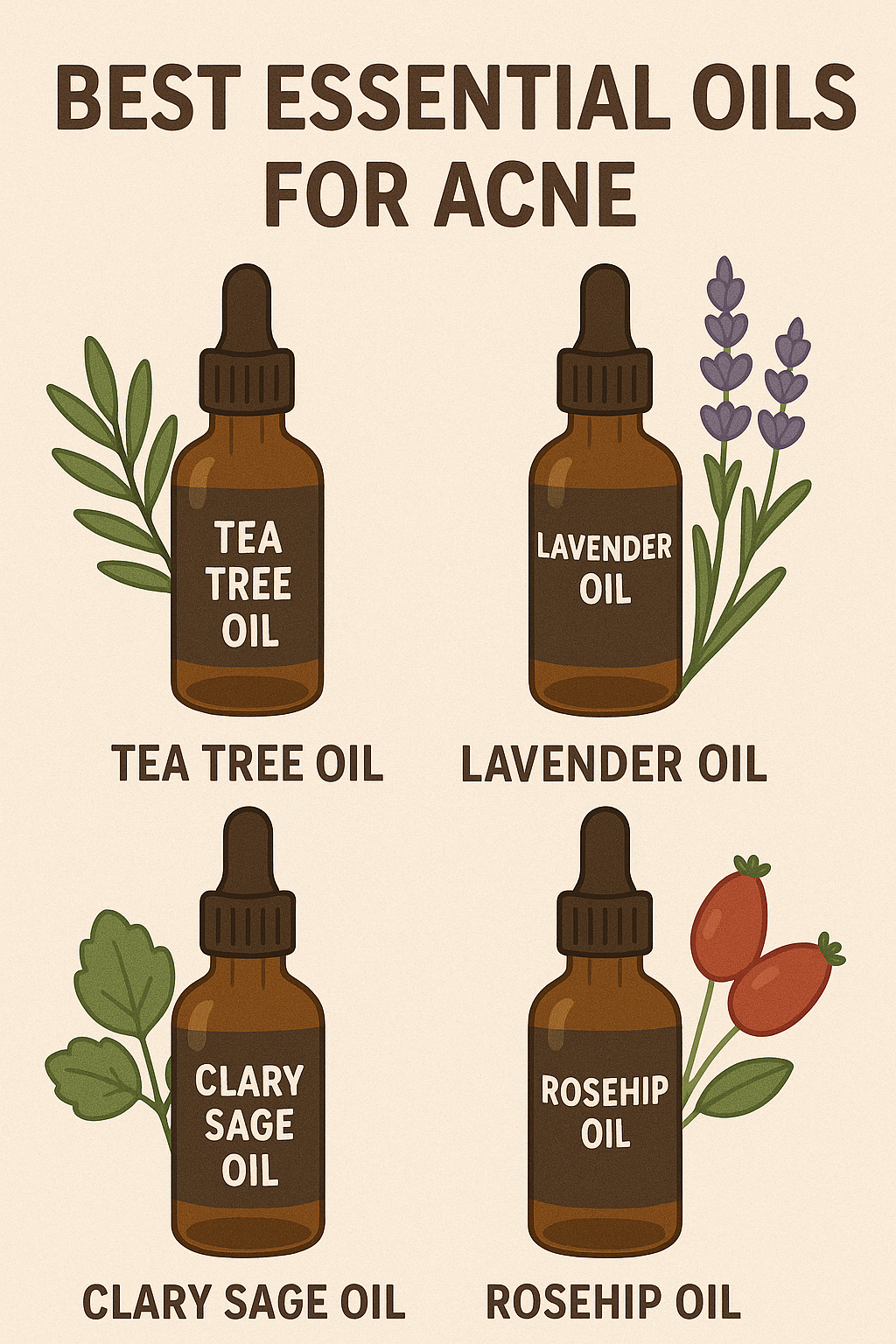Best essential oils for acne
Acne is a common skin concern that affects people of all ages, often impacting confidence and self-esteem. While there are countless over-the-counter and prescription treatments available, many individuals are turning to natural remedies in search of gentler, more holistic solutions.
Among the most popular alternatives are essential oils — concentrated plant extracts known for their therapeutic properties. When used properly, certain essential oils can help combat acne-causing bacteria, reduce inflammation, and promote overall skin health.
What makes essential oils particularly appealing is their ability to address multiple factors contributing to acne, including excess oil production, clogged pores, and bacterial growth. Additionally, these oils often contain antioxidants and soothing compounds that can assist in healing acne scars and preventing future breakouts.
From tea tree oil’s powerful antimicrobial action to lavender oil’s calming and skin-soothing properties, the natural world offers a wide array of options for those seeking clearer skin.
1. Tea Tree Oil
Why it works: Tea tree oil is a powerhouse when it comes to acne treatment. It boasts antibacterial, antifungal, and anti-inflammatory properties, making it effective at killing acne-causing bacteria and soothing irritated skin. It also helps reduce redness and swelling.
How to use:
Dilute 1-2 drops of tea tree oil in a carrier oil like jojoba, grapeseed, or sweet almond oil.
Apply directly to blemishes using a cotton swab as a spot treatment.
You can also add a few drops to your toner or cleanser for broader application.
2. Lavender Oil
Why it works: Lavender oil is known for its calming scent, but it’s also a great ally in acne treatment. It has soothing, antibacterial, and anti-inflammatory effects. Moreover, it helps alleviate stress, which can be a major acne trigger.
How to use:
Mix with aloe vera gel to create a calming, hydrating serum.
Add a few drops to a clay mask to enhance its calming properties.
Blend into your moisturizer for nighttime relaxation and skin repair.
3. Rosemary Oil
Why it works: Rosemary oil is especially beneficial for oily and acne-prone skin. It helps regulate sebum production and has antimicrobial and anti-inflammatory properties.
How to use:
Mix with witch hazel to make a refreshing and toning facial mist.
Add a few drops to your facial steam to open pores and allow deeper cleansing.
Blend into a DIY toner with apple cider vinegar and water.
4. Clary Sage Oil
Why it works: Clary sage is excellent for balancing hormones and oil production. It contains linalyl acetate, which reduces skin inflammation and has natural antibacterial properties.
How to use:
Add a few drops to your favorite carrier oil to make a balancing facial serum.
Mix into a clay mask to help regulate oiliness during hormonal breakouts.
Use in aromatherapy to manage stress levels that can trigger acne.
5. Frankincense Oil
Why it works: Frankincense oil is known for its anti-inflammatory and wound-healing properties. It’s excellent for treating active breakouts and fading acne scars.
How to use:
Combine with shea butter or a carrier oil for a nourishing nighttime balm.
Add to your night oil blend for enhanced skin regeneration.
Apply diluted oil directly to scars to improve skin texture and tone.
6. Lemongrass Oil
Why it works: Lemongrass oil is a natural astringent and has strong antimicrobial properties. It helps tighten pores, reduce oiliness, and eliminate bacteria.
How to use:
Always dilute well due to its potency.
Mix with witch hazel or rose water to create a clarifying toner.
Use as a spot treatment for oily areas.
7. Geranium Oil
Why it works: Geranium oil helps balance sebum production and improves skin elasticity. It also has regenerative properties that make it useful for reducing acne scars and promoting an even skin tone.
How to use:
Add a few drops to your daily moisturizer or night cream.
Mix into clay or honey-based masks.
Use in steam facials to help unclog pores.
How to Use Essential Oils Safely

Essential oils are potent and must be used with care. Here are some safety guidelines:
Dilution is key: Always mix essential oils with a carrier oil like jojoba, grapeseed, or sweet almond oil before applying to skin.
Patch test: Test a small amount on the inside of your wrist or elbow before applying it to your face.
Avoid sensitive areas: Keep away from eyes, mouth, and mucous membranes.
Limit use: Use sparingly; 1-2 drops is typically enough for most applications.
Storage: Keep essential oils in a cool, dark place away from sunlight.
Final Thoughts
Essential oils offer a natural, effective, and aromatic way to combat acne, especially for oily skin types. By choosing the right oils and using them correctly, you can improve your skin health, reduce breakouts, and even enjoy the bonus of a soothing skincare ritual. Remember, consistency and care are key. Incorporate essential oils mindfully into your routine, and you’ll be well on your way to clearer, healthier skin.
Frequently Asked Questions (FAQs)
Q1: Can essential oils completely cure acne? A: While essential oils can significantly reduce symptoms and improve skin health, they may not cure acne entirely, especially if it’s severe or hormone-related. They work best as part of a broader skincare routine.
Q2: What carrier oils are best for oily skin? A: Jojoba oil is closest to the skin’s natural sebum and is great for oily skin. Grapeseed oil and hemp seed oil are also lightweight and non-comedogenic.
Q3: How often should I use essential oils for acne? A: 2-3 times a week is usually sufficient. Daily use may be too harsh, especially for sensitive skin.
Q4: Are there any essential oils I should avoid for acne-prone skin? A: Avoid heavy or highly comedogenic oils like coconut oil on the face. Also, citrus oils can make skin photosensitive, so avoid sun exposure after use.
Q5: Can I mix multiple essential oils? A: Yes, you can create blends, but make sure the total concentration doesn’t exceed safe usage guidelines. A general rule is 1-2% dilution in carrier oil.
Q6: What’s the best way to store essential oil blends? A: Store blends in dark glass bottles in a cool, dry place. This helps maintain their potency and extends shelf life.
Q7: Can teenagers use essential oils for acne? A: Yes, but with caution. Teen skin can be sensitive, so always patch test and use lower concentrations.

